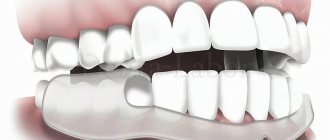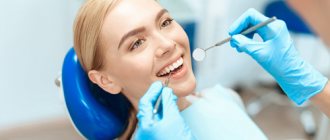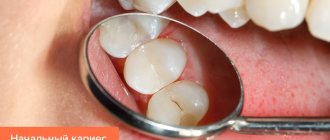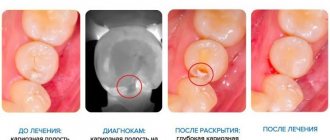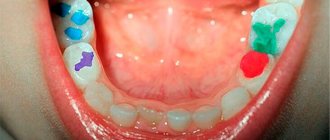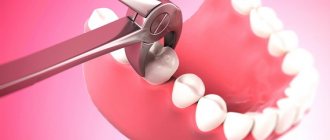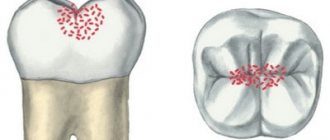Hypersensitivity as the main cause of aching teeth
What could an unpleasant ache in your teeth mean? In fact, there are quite a few possible causes, and many of them are not related to the condition of the enamel. Often the cause of the problem is inflammation of the trigeminal nerve, and in this case the person experiences not just discomfort, but full-blown pain, which can radiate to the ears, temples, eyes and jaws. Treatment of such pathological phenomena is within the competence of a neurologist. The diagnosis is quite serious, so if such symptoms appear, it is better to see a specialist as soon as possible.
But most often, teeth cramp due to hypersensitivity of the enamel (hyperesthesia), in particular when it thins. In this case, it begins to react sharply to cold and hot temperatures of foods and drinks, cold wind, sweet and sour foods, and minor mechanical irritation, for example, during daily cleaning. The reaction of each organism is individual, and many identify pain during hyperesthesia as aching in the teeth.
Teeth sensitivity may be the cause of jaw aches
If unpleasant sensations are caused by thinning of the enamel, it matters how they are localized - in the area of 1 crown or spread over the entire row. In the first case, the cause may be injury or caries. If the pain is generalized, that is, it covers the entire row or even both the upper and lower jaws, the prerequisites may lie in more serious disturbances in the functioning of the internal organs and systems.
Description of the disease
Aches in the gums and teeth appear closer to night, when dental clinics are closed. There are dentists on duty, but they help with severe toothache or acute inflammation in the gums. When the jaw aches, this process occurs with completely healthy teeth and gums.
Common causes of pain:
- drinks too cold/hot;
- walking in cold weather;
- sweet/sour food;
- mechanical damage.
The body's reaction to irritants is different for everyone. Some people's teeth react to cold, others to sweet/sour. In others, they are hypersensitive to mechanical influences: the touch of a toothbrush, a visit to the dentist. There are patients who experience prolonged pain after dental treatment.
A reaction to cold can occur even with absolutely healthy teeth: a person’s cheekbones cramp or their teeth ache very much. This is a very unpleasant feeling that is impossible to get used to.
Note! Sensitivity of teeth to increases or decreases in food temperature indicates a thinning of the enamel layer.
Thinning enamel is an alarming symptom that leads to dental problems. After a reaction to cold or heat, a reaction to sour/sweet will follow, and your teeth will cramp after eating.
Aches in the gums and teeth can be caused by many reasons:
- hormonal changes;
- diseases of internal organs;
- periodic stressful circumstances;
- incorrect bite;
- heredity.
Dental problems can also cause pain:
- exposure of the neck of the tooth;
- gum problems;
- cracks in enamel;
- thinning of the enamel coating;
- deletion;
- bleaching.
Where is the pain located? They can be isolated or generalized (the entire lower jaw hurts). Pain in a single molar is always caused by either caries or a tissue reaction to the implant. But generalized pain, covering the entire jaw or all teeth, is a symptom of more serious diseases than caries.
Why the jaw and teeth often cramp – possible reasons
Usually they say that teeth are cramping when they want to describe discomfort when the enamel is suddenly exposed to temperature - if a food or drink is too cold or hot. Weakened enamel can give an acute reaction even if the temperature difference is not so significant, as well as to spicy, sour and sweet foods, that is, to chemical irritants.
But there are other possible causes, some of which are pathological disorders that require appropriate therapy. The most common causes of the symptom are listed below.
Thinning enamel
Enamel is a durable coating that protects the internal tissues and structures of the tooth from external aggressive factors. When it becomes thin and noticeably weakened, it leads to increased sensitivity. A person begins to experience attacks of acute pain from hot and cold, spicy, sweet and sour. Discomfort also occurs during hygienic cleaning or when biting into hard foods. There are quite a few reasons for this phenomenon, so to find out the etiology you will have to undergo examination by a specialist. Among the common prerequisites, dental experts identify the following phenomena and conditions:
- genetics,
- acute deficiency of vitamins and microelements,
- abnormalities of the jaw system, including malocclusion,
- Bruxism is an involuntary clenching of the jaws at night during sleep, which inevitably leads to pathological abrasion,
- Frequent whitening using aggressive agents, violation of the technique of performing the procedure are common causes of hyperesthesia of the anterior incisors.
Frequent teeth whitening can lead to sensitivity.
The above factors gradually lead to abrasion of the enamel. Over time, this can cause aching teeth and other unpleasant sensations.
Cracks on the enamel surface
Chips and cracks usually occur due to injuries and impacts, as well as constant excessive mechanical stress, for example, as a result of the habit of chewing the tip of a pencil or biting off a thread. Damage to enamel often occurs when brushing too vigorously with a hard-bristled brush. Temperature changes in food and drinks also negatively affect the condition of hard tissues and can lead to the formation of cracks.
Cracks in teeth can cause this symptom
On a note! If it cramps some time after tooth extraction, the cause often lies in accidental nerve damage, which can happen both during the procedure itself, if it was complex, and during the administration of anesthesia. If the symptom does not go away for a long time, it is better to consult a specialist for advice.
Bruxism, jaw surgery and even inaccurate yawning - all this can lead to frequent attacks in which the jaw also cramps. Here you will need the help of a neurologist. To correct chips and cracks, aesthetic restoration is carried out, and to strengthen the enamel, remineralization and fluoridation are carried out.
Pathologies of gum and periodontal tissues
Inflammatory diseases of the gums and periodontium, both acute and chronic, often lead to frequent attacks of aches, including in the jaw. This symptom is especially common in pathological conditions aggravated by purulent processes. The waste products of pathogenic microorganisms accumulate in the thickness of the mucous membrane, provoke inflammation, gradually destroy healthy tissues and at the same time create excessive pressure on them. In addition, with gum disease, the root region of the molars is often exposed, making the enamel especially susceptible to sudden temperature changes and chemical irritants.
Periodontitis causes pain and discomfort
Malfunctions of the digestive system
The condition of the gastrointestinal tract has a direct impact on the health of our teeth and enamel in particular. When digestion fails, hard tissues quickly weaken, become sensitive, and the acid-base balance in the oral cavity is disrupted, which leads to the formation of a favorable environment for the proliferation of bacteria and the development of caries.
Frequent stress
Neuroses, stressful conditions, severe overexcitation - all these factors can lead to rather chaotic symptoms, behind which it can be difficult to identify the true cause. A strong emotional outburst can even provoke inflammation of the facial nerve, and the pain also spreads to the jaw. In neurotic conditions, pain can wake a person right during sleep1. In such a situation, the help of a neurologist and psychotherapist is required.
Stress has a detrimental effect on health
Colds
The answer to the question of whether teeth may be coming together due to reasons not directly related to the state of the enamel is already obvious - there are quite a few potential prerequisites, and not all of them are related to the current state of the enamel. So, for example, sinusitis and laryngitis often negatively affect the tissues of the oral cavity, and with influenza and sore throat, the infection can even penetrate the dental nerves, provoking quite severe attacks.
Hormonal imbalances
Hyperesthesia is a common occurrence during pregnancy, especially in the first trimester. Serious changes occur in a woman’s body, particularly hormonally. At first, there is often a sharp decline in vitamins and microelements, which causes the enamel to weaken and become hypersensitive. A similar situation occurs in women during menopause. Preventive remineralization sessions, as prescribed by the dentist, will help protect the enamel until hormonal levels normalize.
Pathologies of the cardiovascular system – angina pectoris
Attacks of angina are sometimes accompanied by discomfort in the jaw and drying out of the mucous membrane. In such cases, teeth often come together, and the provoking factor can be simple fatigue, sitting in one position for too long, headaches, migraines, or increased nervous excitability. In such a situation, it is important to relax and unwind. If an attack causes serious discomfort, it is better to seek medical help.
Joint diseases - arthritis
Inflammation of the temporomandibular joint provokes quite severe pain, which can occur for no apparent reason. With age, the joints in our body wear out, and constant physical activity leads to their deformation and the development of pathological processes. Here you will need the help of a rheumatologist or orthopedist.
The cause of the pathology can also be joint disease
Carious processes
If the pain and aches are localized in a limited area, it may be due to caries. Usually, a whitish spot first appears on the surface of the enamel, which quickly darkens and gradually turns into a cavity. Pathological processes destroy hard tissues, causing them to lose their protective functions. All this leads to the appearance of discomfort and moderate aching pain at first, which only becomes stronger over time. In this case, the pathological focus can be localized in the root region and remain hidden under the gum - cervical caries. The dentist can detect the problem during a visual examination.
Tooth decay causes discomfort and pain
Gum diseases
This is also a common cause of aches in the gums, jaw and teeth. Every second dental patient suffers from gum disease of varying severity - from gingivitis to periodontal disease. With gingival pathologies, soft tissues become the habitat of entire colonies of microorganisms. The waste products of microbes poison the gum cells and cause an unpleasant sensation of aching pain.
Also, with gum pathologies, the cervical area of the molars is often exposed, which causes the teeth to respond to a change in temperature or a shift in the acid-base balance.
What to do if your jaw and teeth are cramped - symptom treatment
If the reason is the density of the upper protective layer, therapy will be aimed at restoring it, and for this, the patient is usually prescribed a course of remineralization and fluoridation. The essence is to apply concentrated fluoride-containing pastes, solutions and varnishes with a high content of nutritional components to the enamel surface.
“After whitening, my enamel became very sensitive, to the point of pain. It was simply impossible to drink cold food. To be honest, I was very scared then. I went to another doctor who prescribed me a course of mineralization. He said that apparently the solution had been overexposed, in general, this should not have happened. After several sessions I felt better, of course, but I won’t risk whitening my teeth again.”
Nata87, from correspondence on the woman.ru forum
As part of the diagnosis, the patient must be sent for an X-ray examination. In some cases, a blood test is prescribed to detect infection. Based on the premises of the problem, the doctor chooses the appropriate direction of therapy:
- if the jaw is dislocated, a specialist will straighten the joint,
- pain on one side along with the appearance of swelling and heat may indicate poliomyelitis, tonsillitis or an abscess - here you need the help of a surgeon,
- in case of pathological phenomena of a dental nature, for example, with pulpitis or periodontitis, the canals are treated and filled. If a purulent formation occurs, it may require not only its removal, but also resection of the root apex, as well as antibiotic therapy. You will have to visit the dentist several times for a complete cure, but the discomfort should disappear after the first visit,
- if the pain is on one side and radiates into the eye, such a symptom may indicate inflammation of the temporal artery, in which case the patient will be referred to a surgeon,
- if the discomfort is localized in a limited area where there are signs of caries, appropriate treatment is carried out - removal of damaged tissue, antiseptic treatment, filling,
- Since the most common cause of the symptom is the thinning of the enamel and a decrease in its density, in almost all cases remineralization and fluoridation are prescribed - a course of strengthening hard tissues by applying preparations with a concentrated content of fluorine and calcium to them.
Only a specialist can determine the cause of the problem.
To choose the optimal treatment tactics, you need to correctly determine the cause of the aches and other associated symptoms. To do this you will have to undergo appropriate diagnostics. For the same reason, you should not try to get rid of the symptom on your own, with the help of traditional medicine and without first consulting a dentist.
Therapy
Treatment methods for generalized pain depend on the causes:
- inflammation of the gums;
- thinning of the enamel coating;
- psychosomatic diseases;
- hormonal disbalance;
- others.
To restore the density of the enamel coating, a remineralization method based on fluorine and calcium is used. It is from the deficiency of these minerals that tooth enamel suffers. However, to be sure which mineral the enamel needs, a diagnosis is carried out. In areas with high fluoride content in water and soil, remineralization is carried out without fluoride components.
If the facial nerve is inflamed, take painkillers immediately, otherwise the night's sleep will be lost due to severe pain. In the morning you need to make an appointment with a neurologist to undergo a detailed examination. Painkillers with an adequate expiration date should be in every home medicine cabinet. Severe pain always appears in the late evening or closer to night, when pharmacies are closed. Therefore, do not neglect the advice to keep your home first aid kit in proper condition.
With inflammation of the trigeminal (facial) nerve, the pain is localized only in one half of the face - right or left.
With colds, fever appears along with pain in the jaw. To normalize the temperature, take an antipyretic (paracetamol). It is advisable to take an antipyretic with an analgesic effect (pentalgin, sedalgin) so as not to suffer from pain. Gels containing lidocaine or novocaine are good for relieving pain in the gums.
What does traditional medicine offer?
When pain becomes a consequence of hyperesthesia, traditional medicine also comes to the rescue. But we must remember that the thoughtless use of such recipes is fraught with even more serious complications, and, moreover, without examination by a specialist, it is most often impossible to establish the cause and eliminate it. Therefore, the use of the above-described decoctions and infusions in practice is allowed only after their approval by the attending physician.
Decoctions of oak and sage bark
Oak bark helps quickly relieve pain and has disinfectant properties. A decoction from it is prepared in a water bath - there is no point in pouring boiling water over it and insisting, since the beneficial components can only be removed by slow heating. Before use, the product must be filtered and cooled. The resulting solution is used to rinse the mouth.
Gargling with a decoction of oak bark will help in treatment
Sage also has pronounced antiseptic properties. Just pour boiling water over a pinch of herb and let it brew. After this, the product should be filtered and used for rinsing. The decoction perfectly relieves discomfort and provides disinfection of oral tissues.
Products containing chamomile, baking soda and salt
Pharmaceutical chamomile is often recommended for inflammation of the gums. A pinch of dried flowers should be brewed in a glass of boiled water, left for a little while and then strained. Room temperature product is used for rinsing as needed.
Soda-saline solution is also widely popular as an effective remedy for relieving acute inflammatory processes in the oral cavity. It is used for diseases of the gums and periodontal tissues, to relieve symptoms of periostitis and other purulent-inflammatory processes. To prepare the solution, just mix a teaspoon of salt and soda in a glass of warm water. The finished product is used for rinsing the mouth.
Chamomile decoction helps relieve symptoms
Mechanical damage
Injuries, jaw surgery, bruxism, even just yawning can lead to teeth and jaw alignment. Injuries never go away without a trace, and over time they make themselves felt with unpleasant consequences. This also applies to facial surgery performed in the past.
How does bruxism affect the condition of the dental-jaw system? Grinding your teeth in your sleep forces the body to work unscheduled, which provokes premature wear of all tissues. Bruxism is not such a safe and trivial disease as it might seem with a superficial approach to the problem.
With bruxism, the jaw joint is under constant strain and does not rest during sleep. In the morning, the patient may have a headache and jaw pain, and spasms of the dentofacial area may also appear during the day. Bruxism must be treated.
Yawning is a natural physiological process. However, after a yawn, the jaw may also cramp if it was too wide and unexpected. With a wide yawn, the jaw muscle and joint are stressed, so the latter can react by contracting.
If discomfort is felt after every yawn, even a shallow one, it is necessary to undergo examination by a neurologist. If yawning causes severe pain, an examination is carried out by a traumatologist. If you experience discomfort while yawning, you need to change your diet.
Prevention measures
If, due to genetics, you are not prone to problems with enamel, you can try to prevent other causes. Experts in this regard recommend maintaining hygiene, monitoring oral health, and regularly visiting the dentist for preventive care. It would also be a good idea to review your diet and diversify it with foods high in vitamin A: eggs, carrots, liver, dried fruits and fresh apricots.
Calcium and fluoride are important microelements for the health of hard tissues of the oral cavity. The first is found in high concentrations in hard cheeses, fish, dairy products, cabbage, and leafy greens. Fluoride is found in seafood, seaweed and nuts. But you will have to give up carbonated sweet drinks - they have an extremely negative effect on the condition and density of the enamel. It is also worth limiting the consumption of too acidic fruits and juices, sweets and simple carbohydrates.
To strengthen your teeth, you should eat foods rich in calcium and fluoride.
When teeth come together with a certain frequency, especially for no apparent reason, it is better not to ignore the symptom, but to immediately consult a dentist for advice. The phenomenon may be pathological in nature and indicate certain dental problems, diseases of the soft tissues of the oral cavity, or even disturbances in the functioning of internal organs and systems. The sooner you seek qualified help, the easier and faster it will be possible to stop the pathological process.
- Fadneva O.V. Clinical manifestations of increased sensitivity of hard dental tissues, 2001.
Cracks in enamel
Cracks and chips in the enamel appear due to mechanical stress on the teeth: impacts, injuries, or too intense cleaning with a hard brush. Also, the enamel can crack with frequent consumption of chilled or hot foods, or with a sharp change in temperature in the oral cavity. Microcracks are clearly visible to the naked eye; they cover the entire frontal surface of the tooth or part of it.
To restore the integrity of the enamel layer, you need to go to the dentist. To prevent the formation of cracks, do not consume food of contrasting temperature (hot coffee with ice cream), chilled or too hot drinks.
Bottom line
We found out why teeth are cramping. There are many reasons for this pathology, and only a specialist can find out the diagnosis. The jaw may cramp from simple fatigue or nervous overload, but this symptom may also indicate a dangerous disease such as a neoplasm in the facial part of the skull.
Teeth can also ache from yawning too widely, but this condition should be temporary. If discomfort in the jaw appears regularly and does not allow you to live peacefully, you should immediately go to see a therapist. After the examination, the doctor will write a referral to a specialist.
If pain in the jaw and gums suddenly occurs in the evening, you need to take painkillers. In the morning, you need to make an appointment with a therapist, and not let the disease take its course.
A visit to the doctor should not be underestimated if you have previously had a maxillofacial injury or skull surgery. Mechanical damage suffered in the past eventually makes itself felt from the worst side.
Treatment of the pathology is carried out after the diagnosis is made and the causes of the localization of the pain syndrome are clarified. If an infectious process is detected, treatment is carried out with antibiotics. If the cause is cardiac pathology, a course appropriate to it is prescribed. If your temperature rises sharply, you should immediately take an antipyretic, preferably along with a pain reliever.
Pregnant women and women in the premenopausal period should visit a gynecologist if there is pain in the gums and teeth. And for all categories of patients, regardless of age, one should maintain mental balance and not succumb to the provocations of stressful circumstances. Stress can destroy teeth completely if it is under its influence for a long time. Vitamin nutrition, spiritual harmony, timely rest are very important for the health of teeth and gums.
Sources used:
- Basic methods of pain relief at an outpatient dental appointment / Samedov Timur Islamovich. - M.: SpetsLit, 2011.
- Therapeutic dentistry. Anesthesia. Bleaching. Filling. Endodontics / Edited by E.V. Borovsky. - M.: Dentistry, 2005.
- Diagnosis and prevention of dental diseases / Muravyannikova Zhanna Gavrilovna. - M.: Phoenix, 2013.
